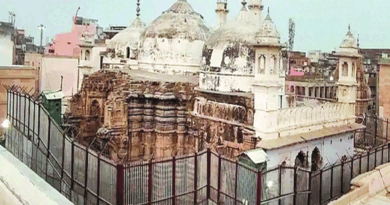Nepal constitution conundrum
Will India endorse Nepal’s constitution? The upcoming Presidential Election is an opportunity for India to do so
I arrived in Nepal as an International Public Financial Management Specialist in January 2015. That day, as I entered the gates of Singha Durbar, the official seat of the Government of Nepal, I saw a huge hoarding with the photo of Prime Minister Shri Narendra Modi of India. I was struck by this show of neighbourly friendliness and asked the driver who spoke highly of the speech of PM Modi delivered in Nepal’s Parliament in August 2014. I felt immensely proud of these sentiments, and the unprecedented popularity of the Prime Minister of the larger neighbour.
During the same year, as the work of the second-time Constituent Assembly accelerated in finalising the constitutional draft, the aspirations of the people of the Tarai-Madhes plains for due representation in national politics surfaced aggressively, sometimes even taking violent turns. Reading between the lines, it became clear to me New Delhi’s orientation towards Nepal’s internal issues continued to receive some consideration in every sphere, especially politically. Meanwhile, with the open border and integrated living a reality, the growing aspirations of the border were important for both Delhi and Kathmandu to recognize.
The tense days of September 2015 still have an agonizing effect on me. A sovereign country was about to promulgate its Constitution on 20th September 2015. None of us could comprehend how the days would unfold after that. I stayed back from work and watched the developments in a pensive mood on the television, with incongruous images of dissenting Madhesi political leaders — Nepali citizens — leaving the Indian Embassy grounds. Days later, the new Constitution was promulgated by President Ram Baran Yadav in a process that was chaperoned by Prime Minister Sushil Koirala. Both President Yadav and PM Koirala hailed from Nepali Congress (NC). Lawmaker Subas Chandra Nembang of UML, the Chair of the Constituent Assembly and Krishna Sitaula of NC, the Convenor of the Constitution Drafting Committee, were the key persons who played key roles.
While many World leaders welcomed the adoption of the new Constitution, India’s reaction was to state that it had “Noted” the action. What had happened was that the Nepali Congress or Communist Parties of Nepal as the two largest parties by far and representing the Nepali polity as a whole were united on Nepal’s Constitution and not keen to wait for New Delhi’s nod. India should be ready to work with all the political parties in Nepal.
The agitating Madhesi leaders could not prevent violence along the border, and safety for cargo and people movement. Some would say New Delhi was being overly cautious, but what happened was the nearly 5 months of cargo blockade and violence. I lived through those hard days together with my Nepali brothers and sisters. No one would have real answers to what, why, where and how the dialogue between Delhi and Kathmandu had broken down, impacting people-to-people friendship and solidarity.
India has special responsibilities as a bigger neighbour. India should have and could have intervened earlier with dialogue and diplomacy and pacified dissenting voices to open the borders. The political leaders of Nepal are still far from implementing the Nepal Constitution to its fullest potential, with its special features about federalism and inclusion in particular. Indeed, the pending issues to be addressed in terms of implementation of the letter and spirit of the Constitution, particularly concerning the marginalised communities and fragile federalism, have emerged in the outcome of the General Elections of 2022. As the government formation through coalitions has already muddied the water, the question now arises as to who will be a sage and an independent President of Nepal to ensure that Nepal evolves as a stable democracy.
The task of the day is that the President of Nepal must be a person well-versed in the content and interpretation of the Articles of the Nepal Constitution and can demonstrate a ‘constitutional ethos’. Given the past attempts by the Prime Ministers of Nepal to misuse the office of the Head of State, the President must be one who will not put a stamp of approval on sensitive ordinances that have not received robust discussion.
Nepal needs a President who can see beyond the horizon into Nepal’s national interest and can seek clarifications if the lawmakers bypass an established mechanism. Both the Presidential candidate Ram Chandra Paudel of Nepali Congress and Subas Chandra Nembang of UML bring the user experience of decades as lawmakers to the table. Without a doubt, the depth of understanding of the Constitution rests with Mr Nembang, who was Chair of the Constituent Assembly in both its avatars. Meanwhile, Mr Poudel’s decades of democratic politics from the times of BP Koirala till the present also put him in good stead.
Given the developments last week of an eight-party coalition with the Nepali Congress as part of the ruling government, it is imperative that a candidate who exemplifies Nepal’s ethnic diversity and can be a bulwark against any extra-constitutional compromises amongst the ruling coalition by the President. If the election of the President is not reflecting the sovereign choice of the voters in the general elections, there is bound to be a national uproar.
Lest one forgets, there is still anger and dissent among those who maintain the ‘foreign hand’ to have been engaged in the devolution of monarchy and ‘forced republicanism and secularism’ denting the very spirit of the country. India is an undoubted favourite that gets blamed when a commoner’s day-to-day life is impacted.
In such an existing situation, will India learn from the experience related to the promulgation of the Constitution, and stand on the side of Nepal’s move towards a robust and vibrant democracy? It must. It is important to nip in the bud any negative notion that India does not support the Constitution and the people behind it.
(The writer is a financial, geopolitical and security analyst)
Source: The Pioneer




